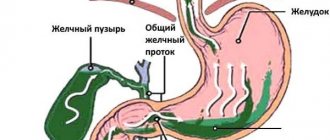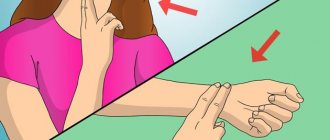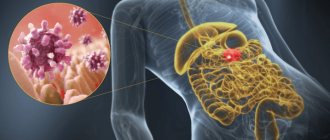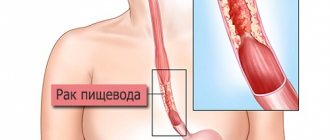Causes and symptoms
Most often, a burning sensation in the stomach occurs due to reflux esophagitis, when the esophageal mucosa comes into contact with intestinal contents. Gastric juice contains a large amount of pepsin, which is involved in the digestion of proteins and the production of hydrochloric acid. It is because of this process that a person experiences discomfort in the stomach area.
The main causes of burning in the stomach, but not heartburn, are:
- Increased production of gastric juice.
- Pathologies of the gastric mucosa - ulcers, gastritis, gastroduodenitis.
- Improper and unbalanced nutrition.
- The presence of pathogenic bacteria in the stomach.
- Worm infestation.
- Disorders of the pancreas.
- Abuse of spicy and fatty foods.
- Drinking alcoholic beverages.
- Stressful state.
- Nicotine addiction.
- Consequences of taking medications.
- Hormonal disorders in the body.
- Pregnancy in women
- Impaired excretion of bile.
The most common cause of burning sensation is poor diet, namely abuse of fried, salty foods, and overeating, which leads to overload of the digestive system.
Medicines can also provoke a burning sensation in the stomach, since, while being a panacea for one disease, they have an extremely negative effect on the functioning of other organ systems. For example, taking antibiotics, destroying beneficial bacteria in the stomach, causes irritation of its mucous membrane. The same effect can occur if the dosage of the drugs is not followed.
However, the most dangerous burning sensation in the stomach is when it is a symptom of certain diseases. So, burning is a characteristic sign of gastritis, that is, inflammation of the gastric mucosa, which leads to digestive problems. With a stomach ulcer, a combination of burning and severe stomach pain is characteristic. The most dangerous disease, which is also characterized by this symptom, is stomach cancer; it can also be accompanied by nausea and vomiting.
Potential symptoms
If a person constantly feels as if his stomach is burning, then the symptom may be a sign of a serious pathology, and not banal heartburn. The following symptoms may indicate problems with the digestive system:
- sour taste of saliva or belching;
- an unpleasant, sometimes putrid smell of breath is a typical sign of poor digestion of food and its retention in the stomach;
- attacks of nausea ending in vomiting;
- pain syndrome;
- hunger pains that appear at night and are not related to nutrition.
https://youtu.be/xpIfveiE73w
Diagnosis of the disease
In order to choose the right treatment method, it is very important to find out the cause of the burning sensation in the stomach. To do this, first of all, you need to consult a gastroenterologist, who will prescribe a comprehensive examination. Typically, the examination includes the following procedures:
- Ultrasound examination of the abdominal organs,
- Esophagogastroduodenoscopy or fibrogastroduodenoscopy.
- Radiography.
- Analysis for pathogenic microorganisms,
- Analysis for helminths,
- pH metric test,
- Clinical and biochemical blood test.
Problems encountered by women
If we talk only about women, then a burning sensation in the lower abdomen can be caused by:
- ectopic pregnancy;
- endometriosis;
- formation of cysts in the ovaries;
- ruptures of ovarian follicles.
The sources of burning in the lower abdomen during pregnancy may vary depending on the period of fetal development. In the first trimester, such sensations may indicate an abnormal pregnancy (development of the fertilized egg outside the uterus). In the second - about stretching of the abdominal muscles, but do not exclude the possibility of pregnancy failure, in the last - about the beginning of labor.
The symptom appears in the following cases:
- with cystitis or colitis;
- irritable bowel syndrome;
- ectopic pregnancy;
- shingles;
- stones in the urinary system;
- when the follicle ruptures.
A burning sensation in the abdomen during an ectopic pregnancy is characterized by paroxysmal manifestations of symptoms. Pain appears in the legs, lumbar region, and problems arise in the rectum. All these signs are accompanied by false signs of emptying at the time of burning in the abdomen.
With appendicitis, the patient not only experiences a burning sensation in the abdomen, but also other ailments. These are fever, attacks of nausea, dry mouth, pain in the right side. When diagnosed, changes in the composition of the blood are observed. Removal of the inflammatory appendix is urgently required; any delay poses a threat to human life and health.
The disease cystitis provokes constant urination, which is accompanied by pain. With stones in the bladder, not only a burning sensation in the abdomen appears, but also a pain in it. Symptoms are permanent.
An inflammatory disease in the urinary system is accompanied by a burning sensation in the abdomen and pain. The patient also experiences a feeling of heat. Ailments occur during bowel movements, and there is also an admixture of blood clots in the urine. The patient's temperature rises and there is a constant urge to urinate.
Treatment of burning sensation - drugs and folk remedies
After making a diagnosis, the doctor prescribes a comprehensive treatment, aimed primarily not at relieving symptoms, but at eliminating the cause of the burning sensation in the stomach. Of the medications whose action is aimed at eliminating the symptom of burning, the most popular are those containing aluminum and copper - Maalox, Phosphalugel, metal hydroxide and complex salts - Almagel. You can also use De-nol, Tribimola, which, when they enter the stomach, create a protective film in it. If the cause of the burning sensation is a violation of the digestive function, the patient will be prescribed prokinetics, for example Motilium, Itomed.
To eliminate the burning sensation in the stomach, you can use traditional medicine methods:
- Sodium bicarbonate, better known as baking soda. To prepare the solution, you need to dilute one teaspoon of soda in 200 ml of water. The liquid is drunk at one time; this solution should not be used if the burning sensation reappears.
- Table salt solution. It is prepared in the same way as the previous one, but it should not be consumed often either.
- Milk copes well with the burning sensation. To do this, 200 ml of milk should be slightly warmed and drunk. Unlike the two previous methods, it can be used without restrictions.
- Mineral water. It can be used either symptomatically or taken in a course of 14-21 days. To do this, you can use mineral water such as: “Essentuki No. 4 No. 17”, “Borjomi”, “Polyana Kvasova”.
- Activated carbon, you should take 2-3 tablets.
In the fight against regular causes of burning in the stomach, but not heartburn, other folk remedies will also help, but they should be used for 1-2 weeks.
- Horse sorrel can be added to salads or consumed as an independent product.
- Buckwheat, for this it should be ground into a powder, take half a teaspoon 2-3 times a day.
- Potato juice. It should be taken half a glass a few minutes before meals 3 times a day.
- Osokori powder. You should eat half a tablespoon with a small amount of water 3 times a day.
- Infusions of St. John's wort, chamomile or plantain. The prepared infusion should be drunk several teaspoons before main meals.
Burning in the pharynx and esophagus - description of the condition
If your stomach regularly bakes, but this is not heartburn, the accompanying symptoms depend on the type of disease and may be as follows:
- a burning sensation in the chest and throat that occurs in the morning, after eating and physical activity;
- pain radiating to the back and ribs is a symptom of the malignant nature of the disease;
- burning only in the stomach is a sign of an ulcer;
- pain with a feeling of rushing heat - indicates esophagitis;
- nausea, bloating, belching and burning in the esophagus are signs of gastritis.
Attention! The causes of burning in the stomach, but not heartburn, cannot always be identified independently. Do not take random medications and put off visiting a doctor. Only a specialist can determine why the stomach is burning and choose the optimal treatment regimen.
Prevention at home
The best treatment for any disease is its prevention. In order to avoid problems with the gastrointestinal tract, you need to carefully monitor your diet and not overeat. The daily menu should contain fats, proteins and carbohydrates in the quantities required for the body.
It is advisable to avoid stressful situations and get rid of bad habits; it is also important not to forget about regular preventive examinations with a doctor.
If you follow these simple recommendations, the likelihood of problems with the gastrointestinal tract will be minimized.
Preventing burning sensation
To prevent burning in the stomach and esophagus from bothering you, you need to maintain a healthy digestive system. First of all, it is necessary to promptly identify and treat pathologies of the gastrointestinal tract and pay attention to their symptoms. The following simple rules will also help prevent unpleasant burning:
- food in moderation, it is better to eat up to 4-5 times a day, but avoid large portions;
- introducing a large amount of vegetables, herbs, fruits and fiber into the diet;
- keeping weight under control; if you need to lose weight, it is recommended to exercise or walk regularly;
- prevention of stressful and conflict situations that contribute to the exacerbation of existing problems with the gastrointestinal tract and the manifestation of new ones in the form of a burning sensation in the stomach;
- cessation of smoking and alcohol abuse.
Advice! If you often feel a burning sensation in the esophagus, you should visit a gastroenterologist and undergo an examination. Prevention of gastrointestinal diseases is better than long and expensive treatment.
A burning sensation in the stomach, especially if it occurs regularly, requires consulting a doctor. If necessary, the gastroenterologist will refer the patient to specialists to identify the cause of a condition similar to heartburn. Treatment is based on an individual plan, using medications and auxiliary methods. People with gastrointestinal diseases are advised to eat right, control their weight and undergo annual spa treatment.
Manifestation of lichen
Regardless of the location of the pain, the main symptom comes first.
However, he is not alone in the development of the disease. Since the causes often lie in gastroenterological problems, the most common symptoms are nausea, vomiting (sometimes with the presence of blood), belching, heartburn, disruption of the bowel movement (diarrhea or constipation), decreased desire to eat or complete refusal of food, pain sensations in the stomach, bloating, gas, burning sensation in the chest. Often a burning sensation in the lower abdomen on the right side occurs due to appendicitis,
- soreness in the area below the navel;
- nausea, vomiting;
- increase in body temperature;
- dry mouth;
- muscle tension of the peritoneum.
When a burning sensation appears in the lower abdomen due to other diseases, the following symptoms often occur:
- severe itching of the skin;
- frequent, painful urge to urinate;
- pain in the abdomen, perineum, which becomes more noticeable when walking;
- chills, fever;
- skin rashes;
- pressure surges;
- constant mood changes;
- sleep problems.
Basic clinical signs that occur in the presence of the main symptom are presented. Each individual person has their own symptomatic picture.
With this disease, pain occurs on the left or right side of the abdomen. An inflammatory process occurs in the body, which is caused by herpetic ganglionitis. The infection inflames all the nerve endings of the internal soft tissues. For this reason, a rash appears on the skin, which is accompanied by itching.











